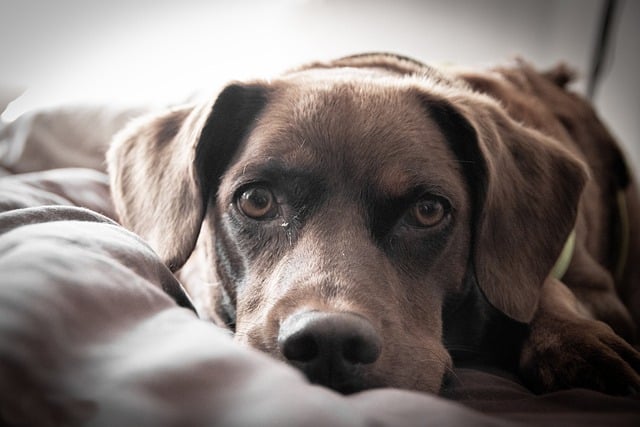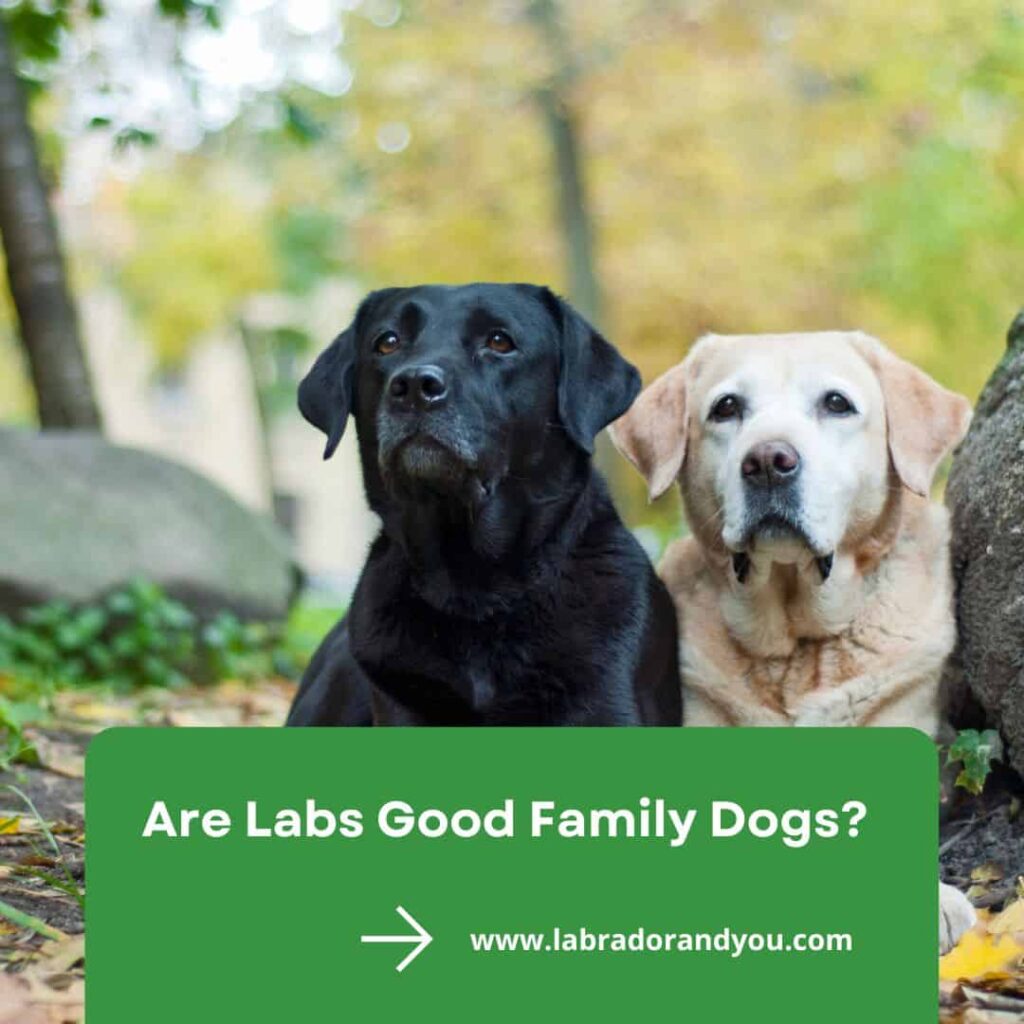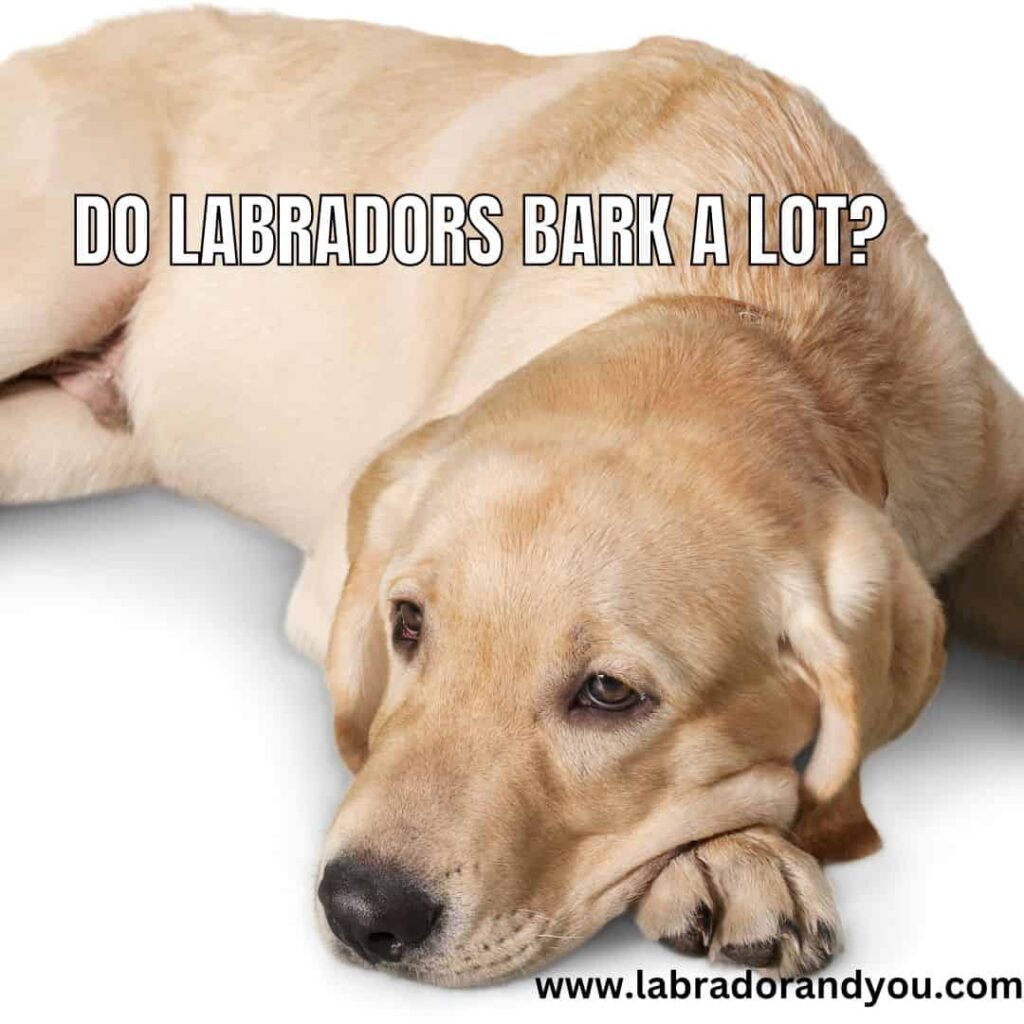A few different issues could cause an increase in dog pooping. If your dog is eating more food, it will consequently poop more. Diarrhea or loose stool can also increase poop frequency. Some foods, like dairy, fat or sugar, may cause diarrhea.
Parasites like intestinal worms can also lead to increased and loose stools. Certain diseases affecting the stomach and intestines, like IBD or cancer, can cause frequent bowel movements. Check for dietary causes first, then consult a vet if it persists, as excessive pooping may indicate an underlying health problem.
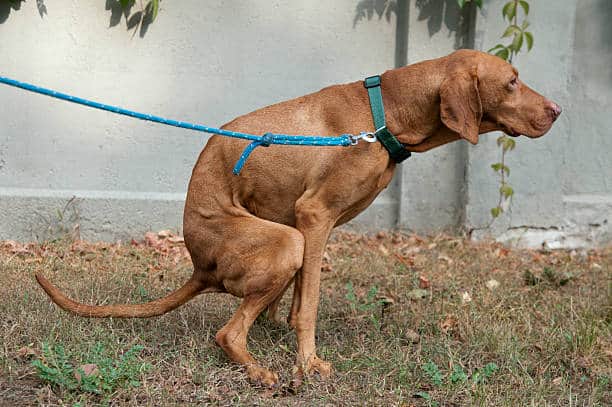
Possible Causes of Excessive Pooping in Dogs
Numerous factors could cause your dog to poop excessively, such as a low-quality diet, abrupt changes in food intake, age-related issues like increased bowel activity in older dogs.
Other potential causes include infections from parasites or bacteria and mental stressors such as anxiety.
Low-quality diet
Your dog’s diet is very important. A low-quality diet can lead to many poop problems. Dogs need good nutrition for good health. If your dog eats food that is not good, their stomach will be upset.
This makes them poop more often than normal. This is often seen when dogs eat too much dry kibble or raw food. Also, poor diets can make dogs have loose stools or diarrhea because the body cannot digest it well.
Sudden changes in diet
A quick shift in your dog’s meals can lead to too much pooping. This happens when you change their food all at once, instead of slowly over time. It can upset their stomach and cause diarrhea.
Like us, dogs need time to get used to new foods.
If there is a lot of fat in your dog’s poop, it might be due to the food they eat. Too much fat in the diet may not be good for them. It could mean that they are not getting the right balance of nutrients from their meals.
Age-related issues
Dogs change as they get older, just like people. Older dogs poop more often because their bodies are not as strong. The muscles that help them hold in poop can get weak. This is a common age-related issue in senior dogs.
Elderly canines may also suffer from diseases that make them lose control of their bowels. A disease called degenerative myelopathy causes muscle loss and weakness in the back legs of aging dogs, making it hard for them to hold in their poop.
These conditions mean an old dog might need to go outside more often than a young one.
Parasites and bacteria
Germs like parasites and bacteria can make dogs poop more. Dogs can catch roundworms, whipworms, or hookworms from the dirt. They might also get Giardia or tapeworms while sniffing around.
These bugs all cause bad poops in dogs. Some types of bacteria are harmful too. Salmonella and E coli are found in dog’s stool and make them poop a lot more than normal. Puppies or very stressed dogs may fall sick from these germs faster, leading to loose stools and loss of water from their bodies.
It is important to clean up after your pet because some kinds of Giardia germs found in dog feces can make people sick as well!
Stress and anxiety
Dogs get upset too. Stress and anxiety can cause bowel issues in dogs, which leads to more pooping. Changes at home or feeling scared may trigger this stress. This is called stress colitis, a common problem that causes loose stool in dogs.
When a dog feels anxious, their body responds by causing stomach upset and other digestive problems. You might see soft or loose poop with a coating of mucus if your dog has stress colitis.
So, keeping your pet calm helps keep his tummy happy too!

How Often Should Dogs Poop?
Understanding a dog’s normal poop schedule is fundamental to identifying any digestive issues. Adult dogs usually poop once or twice a day, while puppies might go as many as five times per day.
If your dog isn’t pooping enough, it could be due to constipation resulting from dehydration, low fiber diet, lack of exercise or some underlying health issues. Monitoring your pet’s daily bowel movements can help track any abnormalities and address potential problems early on.
Normal poop schedule for dogs
Dogs’ poop schedule can change based on their diet and health. Most adult dogs should go at least once a day. But if a dog is healthy, they could poop 1-3 times per day. For puppies, they may need to go as many as five times or more daily because of their small size and fast metabolism.
The kind of food your dog eats also affects how much they poop. A lot of fiber in the diet can make the poop bigger.
What to do if your dog isn’t pooping enough?
Your dog may not be pooping enough. Here are some things you can do:
- Check your dog’s diet. Make sure they eat enough fiber.
- Boost their probiotics. This can help their stomach health.
- Give them good exercise every day. This helps their bowel movements.
- Look for changes in stool consistency or color. These might tell you if there is a problem.
- See a vet if your dog hasn’t pooped all day. It could be a sign of ill health.
Why Is My Dog Pooping So Much?
Overfeeding, certain medications and supplements, intestinal issues, bacterial and viral infections, or malabsorption syndrome can all lead to increased poop frequency in dogs.
Overeating and overfeeding
Overeating can make dogs poop a lot. Feeding your dog too much food can put extra work on their belly. The belly then has to get rid of the extra food. This leads to more poop.
Feeding a dog too much, even healthy foods, can hurt their tummy. It may lead to gas and other issues in the gut parts of your pet’s body. Always give them just enough food for their size and age to prevent this.
Medications and supplements
Some pills or supplements make your dog poop more. This is often seen with medications for dogs. The cause is the changes these things make in your dog’s stomach and gut health. Sometimes, drugs meant to help can lead to too much pooping.
For example, if a dog eats too much, vets may give drugs to get rid of extra food quickly through pooping. Even some vitamins or healthy extras added to your pet’s meals might change their poop schedule as well.
Intestinal issues
Your dog’s tummy may be causing more poop. This is what we call intestinal issues. It can be an upset stomach or serious problems like inflammatory bowel disease. Sometimes bugs in your dog’s gut cause this issue too.
They start to grow and make your dog feel sick. Your pet may also have pain in the belly from these issues, leading to more trips outside for a bathroom break. Dogs with long-term constipation could have something blocking their path inside or outside of the intestines.
Bacterial and viral infections
Bad bugs can make your dog poop a lot. Some germs like Salmonella and E. coli are bad for dogs too, not just humans! They can hurt your dog’s gut and cause diarrhea.
A germ called parvo is also a problem for dogs, it can make them very sick and give them diarrhea as well.
Another bug, Campylobacter, can upset your dog’s stomach and lead to more poop. These germs pass from one dog to another through poop or dirty water. So keep an eye on where your dog plays!
Malabsorption syndrome
Malabsorption syndrome can make your dog poop a lot. This is when your dog has trouble taking in food from his gut. One reason for this might be exocrine pancreatic insufficiency (EPI).
EPI means that the pancreas isn’t making enough of the stuff it needs to break down food.
This problem makes it hard for dogs to get nutrients. They may lose weight, even if they are eating well. Chronic diarrhea is another sign your dog may have malabsorption. If you think this might be why your dog is pooping so much, take them to see a vet right away.
Dogs with this issue often have stool that looks strange and smells bad. Tests on the stool can help tell if it’s malabsorption or another disease-causing problems for your pup.
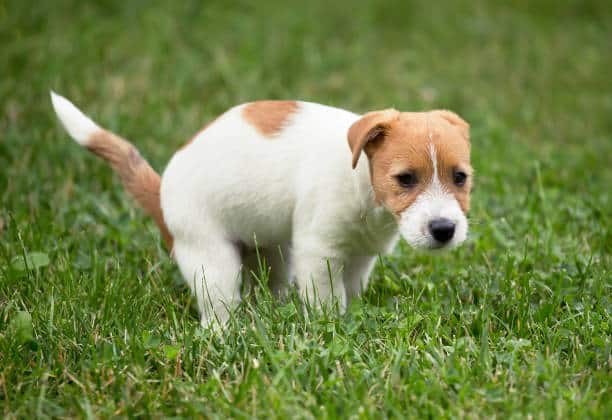
A Closer Look at Dietary Changes
In this section, we delve into the importance of a high-quality diet for your dog, why abrupt changes to their meals can lead to excessive pooping, and considerations needed based on your furry friend’s age and health condition.
Choosing a high-quality dog food
Your dog needs good food. Pick a premium, nutritious brand. Look for fresh meat, veggies, grains and fruits in the list of ingredients. High-quality food cuts down poop by 50% to 70%.
If you feed raw diet to your dog, make sure it has the right bone content. Too much bone can cause hard poops. A slow switch to better food helps control too much pooping in dogs. Healthy foods are also good for your dog’s overall health.
Avoiding sudden changes in diet
Changing your dog’s food all at once can upset their stomach. Here are some points to keep in mind:
- Sudden diet changes can make dogs sick.
- A slow diet switch eases your pet into new food.
- Quick diet changes increase the risk of runny poop.
- Gradual transitions help prevent digestion issues.
- Picking the right diet supports healthy bowel movements.
- Dogs need a balanced diet for proper nutrients.
- Know your dog’s nutritional needs before switching foods.
- Keep an eye on fiber intake to control poop amount.
- Food intolerance might cause frequent pooping.
- Slow and careful diet change helps prevent bad smells in poop.
Considering your dog’s age and health
A dog’s age plays a big role in how much it poops. Younger dogs usually poop more often than older ones. This is normal. As your dog grows, its body changes. It might not need to go as often.
Your pet’s health also matters a lot. Dogs with belly problems may poop too much or too little. These issues can come from sudden diet changes or low-quality food. So, always choose high-quality food for your furry friend.
It’s important to adjust the meals of older dogs too. Their bodies don’t work the same way they used to when they were younger and need different nutrients now.
Just like humans, dogs can have tummy upsets if their food gets changed all at once! To avoid this, make any diet change slowly over time.
If you see anything strange – like your pup going more often than usual – take them to a vet right away.
Symptoms of Excessive Pooping
Spotting symptoms of excessive pooping in your dog can include observing diarrhea, noticing straining during defecation, or seeing any stark changes in the stool’s color and consistency.
Diarrhea
Your dog may have diarrhea if they are pooping a lot. It is an important sign of too much bowel action. The stool may be loose or watery. Sometimes, the dog might feel pain in their tummy.
This condition often means there is upset in the gut. Dogs can get this from eating something odd. One common reason for diarrhea in dogs is colitis – an issue with the large bowel causing small but frequent stools.
If your dog has long-term diarrhea, you should watch out for signs like weight loss and feeling tired all the time because it could mean serious health trouble for your pet.
Straining or difficulty pooping
Dogs may show signs of straining when they are pooping too much. This is a sign that something is wrong with their digestive system. They might feel pain or discomfort in their belly area.
Some dogs may even have dry or hard poop because they are not getting enough water. Other dogs may seem very tired, refuse to eat, or start throwing up. In some cases, these dogs will pass only a little bit of runny poop or blood because they’ve been pushing so hard to go potty.
If this straining goes on for too long, the dog’s rectum can pop out from its body. This is called a rectal prolapse and it can be serious if not treated by a vet right away.
Changes in stool consistency and color
Changes in how your dog’s poop looks can tell us a lot about their health. One sign of excessive pooping is seeing different colors and shapes in the stool. Black stools, known as melena, means your pet may be eating blood.
This comes from many things.
Dog poop color can also show other health problems. Green stools mean your dog might eat too much grass or have gallbladder issues. On the other hand, orange or yellow poop could point to issues with the pancreas or digestive tract.
Now let’s talk about soft or hard feces. Soft stool can occur when dogs eat food they should not have eaten. Hard stools might mean they need more water and fiber-rich foods.
In any case, if you notice these signs often, it’s time to see a vet right away for tests and treatment.
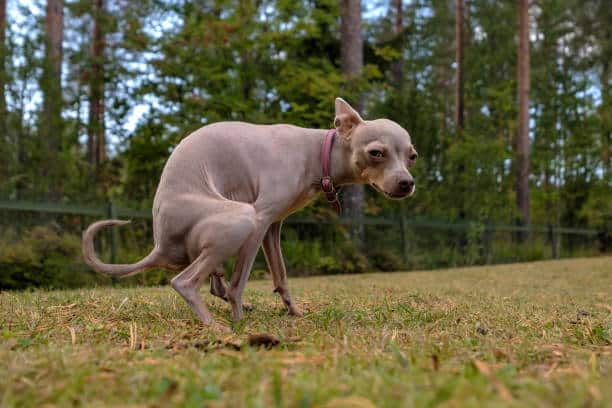
When to See a Vet?
Identifying when it’s time to consult with a vet can be a crucial step in ensuring your dog’s health – Learn about the signs of persistent or severe symptoms, how to interpret frequent pooping without apparent cause and why monitoring your dog’s poop schedule is important.
Persistent or severe symptoms
If your dog’s poop issues last a long time, it’s time for the vet. Weight loss or feeling very tired can be signs that something is wrong. A rough coat of hair is also a sign to watch out for.
Dogs with bad diarrhea may have blood in their poop. This can make them feel weak and get sick with fever or belly pain. Some dogs stop eating when they feel this way. Inflammatory bowel disease (IBD) could cause these problems, too, besides throwing up more than usual and losing weight fast.
Your dog might need help changing its food if dry or hard stools are a long-lasting problem.
Frequent pooping with no apparent cause
Your dog may poop a lot for no clear reason. Diet, stress, or age could be the cause. But sometimes, it is not easy to see why this happens. If your dog poops too much and you can’t see why, it’s time for the vet to check your pet.
The vet will look for health issues in your dog’s belly area. They might find things like bugs in the belly or an issue with how food breaks down inside your dog. It’s key to note that lots of bowel movements can mean something bad is happening with your pet’s health! Don’t wait if you notice this change in your pup!
Monitoring your dog’s poop schedule
Keeping an eye on your dog’s poop schedule is a must. Here’s why:
- Adult dogs go poo 1 – 3 times per day. This is normal.
- A change in the number of times your dog poops can show health issues.
- Dogs might poop more if they are sick or eat too much food.
- If your dog only goes poo once every two days, it could mean they are not eating enough.
- Sometimes, changes in how often a dog poops can happen because of stress or new food.
- Look at the color and thickness of your dog’s poop too. It can tell you if your dog is healthy or not.
- Poop that has red blood shows there might be damage in the bowel.
- If you see changes in how often your dog poops, it’s time to call the vet.
How to Help Dogs with Excessive Pooping?
To aid dogs dealing with excessive pooping, it’s crucial to implement dietary changes such as choosing high-quality dog food and controlling portion sizes. Regular exercise can help improve your dog’s digestive health.
It’s also important to avoid feeding your pet table scraps, which could disrupt their stomach. These steps can aid in regulating your pet’s bowel movements and reducing instances of excessive pooping.
Dietary changes
Food affects how much your dog poops. The right diet can help stop too much pooping. Here are some changes you can make:
- Swap low-quality food for high-quality dog food. High-quality meals are easier for your pet to digest. This can lead to less poop.
- Don’t change the food suddenly. Dogs get upset guts if their food changes quickly. So, change food slowly over a week or so.
- Think about your pet’s age and health when feeding it. Old dogs may need different foods than young ones do.
- Keep an eye on your pet’s poop after changing its diet. If there is less poop and it looks normal, the new diet is good.
- Stay away from table scraps and treats that aren’t meant for dogs. These foods can lead to more poop because they’re hard for dogs to digest.
- Only feed your dog the right amount of food each day – no more, no less! Overfeeding leads to too much poop.
- A dog with allergies might need a special diet. Poor diets can lead to issues in the digestive system and create more poop.
Regular Exercise
Dogs need regular exercise to stay healthy. Walking or playing daily can help your dog’s digestive system work well. Physical activity helps move food through the body and turns it into poop.
Exercise also keeps dogs at a good weight, which is important for their health. If dogs don’t get enough exercise, they might have trouble pooping because physical activity stirs up the inside of their bodies.
Your dog will feel better with an active lifestyle and a good workout routine!
Avoiding table scraps
Table scraps can make your dog poop too much. They are high in fat and calories. This is not good for your dog’s diet or their poop routine.
Instead of table scraps, give them healthy dog treats. Keep a balance in their food and snacks. Too many fats or calories will upset their stomachs. Stick to their meal plan and keep them on track with regular eating times.
Proper portion control
Feeding your dog the right amount of food is key to their health. This is what we call proper portion control. Here are some tips to help with this:
- Check the back of your dog’s food bag for feeding guidelines. This can give you a hint about how much your dog should eat each day.
- Use a measuring cup when you serve your dog’s food. This helps make sure they get the same amount at each meal.
- Keep track of how many treats and snacks your dog gets daily. These count towards their daily food amount too.
- If you’re unsure, ask your vet how much food your dog should eat in a day.
- Do not overfeed or allow free access to food all day long as it may cause excessive poop.
- Make changes to portion size gradually if you notice frequent bowel movements or other signs of overeating.
Dog Pooping Thing You Must Know
Is frequent pooping normal?
Dogs poop a lot, but you might worry if it’s too much. Normal poop times for dogs are one to five times a day. This depends on their age, diet, and health. It’s normal if your dog poops more when they eat more or after exercise.
But, big changes in how much they poop may show something is wrong. If your dog has stress or feels sad, they might poo more often. Overeating can also make them do this too much and harm their belly health.
Pooping should not be hard work for dogs. If it is tough for them to poo or if there’s blood in the stool, quickly take them to see a vet.
What if my dog is pooping a lot but is still skinny?
Your dog may poop a lot and still stay skinny due to several reasons. They could be on a poor diet, which results in more bowel movements. This means the food they eat passes through their system too fast.
The body doesn’t get enough time to take in nutrients.
Stress can also cause your dog to poop more than usual. Stress makes the body work faster, including making waste come out quicker. Age-related problems might make older dogs lose weight while pooping often.
Parasites are another reason your dog could be skinny but pooping a lot. Worms live inside them and eat the food before it can nourish your pet’s body.
A vet can help you find out what is wrong with your dog and how to fix it if this happens.
What if my dog is pooping a lot but not experiencing diarrhea?
Your dog could be pooping a lot even without diarrhea. This might be due to some health problems or changes in diet. Some dogs poop more because they eat too much, or the food they eat is not good enough for them.
Stress can also make your dog poop more than usual. If you see any signs of discomfort when your dog tries to poop, it’s important to take them to the vet right away.
The vet will check if there are serious issues that need treatment like intestinal problems, parasites, infections or malabsorption syndrome.
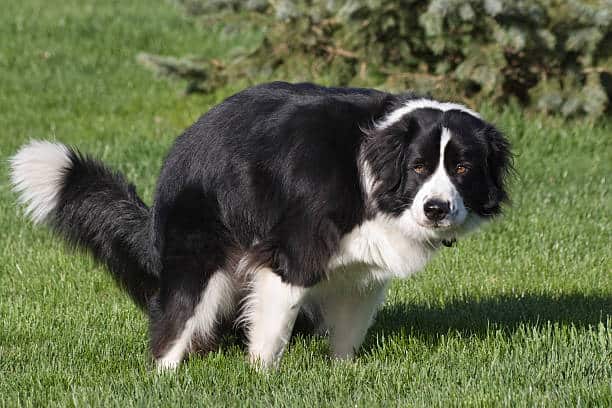
Conclusion
Your dog might poop a lot for many reasons. These include what they eat, age or health issues. If your dog is pooping more than usual, get help from your vet. They can tell you if there’s a problem and how to fix it.
FAQs
1. Why is my dog pooping so much?
Your dog might be pooping a lot because of eating too much food, changes in diet, or an upset stomach.
2. Can I stop my dog from pooping so much?
Yes, you can try to give your dog smaller meals and make sure they’re eating healthy food to help control their poop.
3. Is it normal for a puppy to poop more than an adult dog?
Yes, puppies usually poop more often than adult dogs since they have faster metabolisms and are growing quickly.
4. What should I do if my dog’s stool is runny or has blood in it?
If your dog has runny stool or blood in the poop, take them to see a vet right away as this could be a sign of illness.
5. Does giving my dog treats cause him to poop more?
Too many treats can lead to an upset tummy which may increase the number of times your dog needs to go potty.
Author Profile

- In House Labrador Trainer
- Samta is an experienced Labrador trainer and enthusiast with over 5 years of hands-on experience, contributing invaluable insights and advice to Labradorandyou.com. Her deep understanding of Labrador temperament and intelligence underpins her effective training techniques and product recommendations. Through firsthand experience of the joys and challenges of raising Labradors, Samta's articles provide expert advice for both seasoned and new Labrador owners, covering training, care, and innovative product selection. Her commitment to enhancing the well-being of Labradors and their owners permeates her work, making it an indispensable resource for Labrador enthusiasts
Also by the author
 FAQNovember 16, 2023Why Is My Dog Pooping So Much? MUST KNOW Facts
FAQNovember 16, 2023Why Is My Dog Pooping So Much? MUST KNOW Facts FAQNovember 16, 2023Why Is My Dog So Skinny? 9 Reasons With Solutions
FAQNovember 16, 2023Why Is My Dog So Skinny? 9 Reasons With Solutions Mix-BreedsNovember 16, 2023Straight Haired Labradoodles Complete Guide: All You Need To Know
Mix-BreedsNovember 16, 2023Straight Haired Labradoodles Complete Guide: All You Need To Know Lab-TypesNovember 6, 2023Block Head Labs: Are They Better And Healthier?
Lab-TypesNovember 6, 2023Block Head Labs: Are They Better And Healthier?

